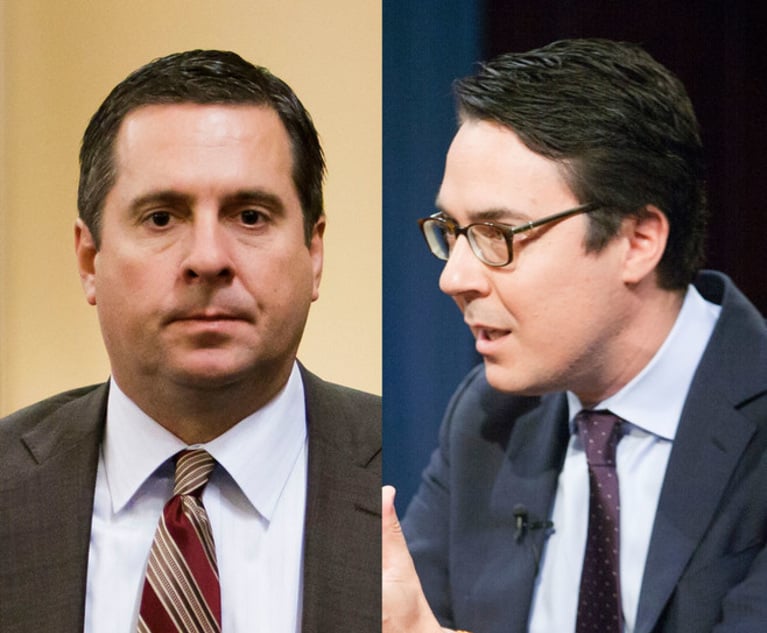Oakland Judge Leans Toward New Trial or Slashing Damages on $2B Roundup Verdict
Alameda County Superior Court Judge Winifred Smith found in a tentative ruling that the trial evidence did not support that Monsanto “consciously disregarded a known probable danger” that its Roundup herbicide contained carcinogens, requiring a reduction of damages.
July 19, 2019 at 05:51 PM
4 minute read
 Winifred Smith Alameda County Superior Court Judge.Photo: Hillary Jones-Mixon.8/04/2011.055-2011
Winifred Smith Alameda County Superior Court Judge.Photo: Hillary Jones-Mixon.8/04/2011.055-2011
OAKLAND — An Alameda County Superior Court judge says she's inclined to grant a new trial in a case that garnered a $2 billion verdict against Monsanto unless the plaintiffs, who claim that the company's Roundup herbicide causes cancer, agree to lower damages.
“The court finds the evidence can support a finding by clear and convincing evidence that Monsanto committed malice, oppression, or fraud,” Judge Winifred Smith wrote in a tentative ruling Thursday. “The evidence did not show that Monsanto consciously disregarded a known or probable danger as shown in the public scientific literature.”
In post-trial arguments Friday in Oakland, Smith quietly listened as plaintiffs lawyers asked the judge not to touch economic damages and suggested they would be willing to accept a 9:1 ratio of punitive to compensatory damages, adding up to around $500 million in punitive damages. Meanwhile, Monsanto spent much of the hearing drawing parallels to a Johnson & Johnson talc case where the Court of Appeal granted a new trial and reduced verdict.
The conditional and tentative ruling rolls back a May 13 verdict granting Alva and Alberta Pilliod $1 billion in punitive damages each for Monsanto's alleged role in causing the couple's non-Hodgkins lymphoma. The Pilliods received the largest award out of three other trials alleging Roundup use caused cancer.
At Friday's hearing, the Pilliod's lawyers said that the verdict should aim to deter Monsanto's conduct. “If it doesn't sting, it's a waste of time,” said Michael Miller of The Miller Firm in Orange, Virginia, citing Simon v. San Paolo U.S. Holding.
Miller also argued that Monsanto's argument for reversing the jury's decision would make the Seventh Amendment a joke. “Nothing they told you this morning was accepted by the jurors,” he said. “What on earth are we doing bringing these people in if we are going to disregard what they decide?”
Tarek Ismail, a partner at Goldman Ismail Tomaselli Brennan & Baum representing Monsanto, argued that the excessive $2 billion punitive award reflected a tainted process. Ismail said the jury's decision to issue the same award to both Alva and Albert Pilliod, despite different time periods and severity of their illnesses, is evidence that jurors acted upon passion, prejudice and fear, rather than the facts of the case
Ismail argued that fear could've been inspired by the plaintiffs lawyers misconduct and breach of court orders. When the plaintiffs' team handled a Roundup bottle filled with water with gloves, and sprayed it near the juror box, Ismail said the jurors visibly jumped back and one asked if they should be concerned about the incident.
“The question is was there a result obtained here more favorable for the offending party than they otherwise would have obtained,” he said.
Smith acknowledged the plaintiffs' misconduct in her tentative ruling but wrote that the actions did not cause prejudice.
To support its motion for judgment notwithstanding the verdict, Monsanto's legal team cited Echeverria v. Johnson & Johnson, a recent Second District Court of Appeal siding with Johnson & Johnson in a talc powder products liability case, in part, because it could be reasonably argued whether talc powder use caused ovarian cancer. “In the J&J case, statistical association between talc and ovarian cancer remained under scientific investigation,” said Monsanto attorney Lee Marshall, a partner at San Francisco's Bryan Cave Leighton Paisner. “That is true in this case, given that there were new studies coming out in the midst of trial.”
Marshall also pointed to a ruling by U.S. District Judge Vince Chhabria of the Northern District of California to argue that punitive damages were inappropriate. Earlier this week, Chhabria cut down a “constitutionally impermissible” $80 million punitive damages award given to Edwin Hardeman, who claims he contracted non-Hodgkin lymphoma after spraying his 56-acre Sonoma County property with Roundup for about 20 years. Chhabria lowered the damages to about $25.3 million. “Monsanto's conduct, while reprehensible, does not warrant a ratio of that magnitude, particularly in the absence of evidence showing intentional concealment of a known or obvious safety risk,” he wrote.
Marshall said that Chhabria's ruling proves that Monsanto's communications with the United States Environmental Protection Agency did not demonstrate despicable behavior. “Even Judge Chhabria held that Monsanto's relationship with EPA employees did not render invalid the EPA's regulatory determination on glyphosate.”
Smith said she would return a ruling on the post-trial arguments shortly.
This content has been archived. It is available through our partners, LexisNexis® and Bloomberg Law.
To view this content, please continue to their sites.
Not a Lexis Subscriber?
Subscribe Now
Not a Bloomberg Law Subscriber?
Subscribe Now
NOT FOR REPRINT
© 2025 ALM Global, LLC, All Rights Reserved. Request academic re-use from www.copyright.com. All other uses, submit a request to [email protected]. For more information visit Asset & Logo Licensing.
You Might Like
View All
Devin Nunes, Former California GOP Congressman, Loses Move to Revive Defamation Suit
6 minute read
'Close Our Borders?' Senate Judiciary Committee Examines Economics, Legal Predicate for Mass Deportation Proposal
3 minute read
A Judge Asks: Is It Time to End Ken Feinberg's Roundup Settlement Program?
7 minute read
Trending Stories
- 1Trump's DOJ Files Lawsuit Seeking to Block $14B Tech Merger
- 2'No Retributive Actions,' Kash Patel Pledges if Confirmed to FBI
- 3Justice Department Sues to Block $14 Billion Juniper Buyout by Hewlett Packard Enterprise
- 4A Texas Lawyer Just Rose to the Trump Administration
- 5Hogan Lovells Hires White & Case Corporate and Finance Team in Italy
Who Got The Work
J. Brugh Lower of Gibbons has entered an appearance for industrial equipment supplier Devco Corporation in a pending trademark infringement lawsuit. The suit, accusing the defendant of selling knock-off Graco products, was filed Dec. 18 in New Jersey District Court by Rivkin Radler on behalf of Graco Inc. and Graco Minnesota. The case, assigned to U.S. District Judge Zahid N. Quraishi, is 3:24-cv-11294, Graco Inc. et al v. Devco Corporation.
Who Got The Work
Rebecca Maller-Stein and Kent A. Yalowitz of Arnold & Porter Kaye Scholer have entered their appearances for Hanaco Venture Capital and its executives, Lior Prosor and David Frankel, in a pending securities lawsuit. The action, filed on Dec. 24 in New York Southern District Court by Zell, Aron & Co. on behalf of Goldeneye Advisors, accuses the defendants of negligently and fraudulently managing the plaintiff's $1 million investment. The case, assigned to U.S. District Judge Vernon S. Broderick, is 1:24-cv-09918, Goldeneye Advisors, LLC v. Hanaco Venture Capital, Ltd. et al.
Who Got The Work
Attorneys from A&O Shearman has stepped in as defense counsel for Toronto-Dominion Bank and other defendants in a pending securities class action. The suit, filed Dec. 11 in New York Southern District Court by Bleichmar Fonti & Auld, accuses the defendants of concealing the bank's 'pervasive' deficiencies in regards to its compliance with the Bank Secrecy Act and the quality of its anti-money laundering controls. The case, assigned to U.S. District Judge Arun Subramanian, is 1:24-cv-09445, Gonzalez v. The Toronto-Dominion Bank et al.
Who Got The Work
Crown Castle International, a Pennsylvania company providing shared communications infrastructure, has turned to Luke D. Wolf of Gordon Rees Scully Mansukhani to fend off a pending breach-of-contract lawsuit. The court action, filed Nov. 25 in Michigan Eastern District Court by Hooper Hathaway PC on behalf of The Town Residences LLC, accuses Crown Castle of failing to transfer approximately $30,000 in utility payments from T-Mobile in breach of a roof-top lease and assignment agreement. The case, assigned to U.S. District Judge Susan K. Declercq, is 2:24-cv-13131, The Town Residences LLC v. T-Mobile US, Inc. et al.
Who Got The Work
Wilfred P. Coronato and Daniel M. Schwartz of McCarter & English have stepped in as defense counsel to Electrolux Home Products Inc. in a pending product liability lawsuit. The court action, filed Nov. 26 in New York Eastern District Court by Poulos Lopiccolo PC and Nagel Rice LLP on behalf of David Stern, alleges that the defendant's refrigerators’ drawers and shelving repeatedly break and fall apart within months after purchase. The case, assigned to U.S. District Judge Joan M. Azrack, is 2:24-cv-08204, Stern v. Electrolux Home Products, Inc.
Featured Firms
Law Offices of Gary Martin Hays & Associates, P.C.
(470) 294-1674
Law Offices of Mark E. Salomone
(857) 444-6468
Smith & Hassler
(713) 739-1250






